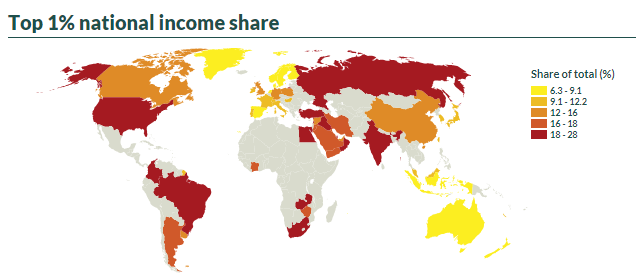Quartz: US Sets Bad Example on Inequality
Despite ample warnings, including the book “Capital in the Twenty-First Century” by Thomas Piketty, inequality continues to rise in most parts of the world: the top 10 percent in the United States, Sub-Saharan Africa, Brazil, India and the Middle East own about half the wealth. More than 100 researchers from 70 nations monitor the dangers through the World Inequality Lab, based at the Paris School of Economics, reports Eshe Nelson for Quartz. Piketty suggests that inequality stems from globalization but at different rates. The United States – due to unequal access to education, massive wage hikes for corporation’s top managers and a less progressive tax rate – sets a poor example while Europe is a role model for other countries in resisting inequality. “In the US, there has been a ‘dramatic collapse’ in the income share of the bottom 50% that isn’t replicated in other advanced economies, the report says, suggesting that policy is to blame,” Nelson writes. Even though the bottom 50% have got a “modest” post-tax income boost, thanks to some redistribution over the years, this effect was wiped out by rising healthcare spending.” The report concludes that some inequality is inevitable. Recommended policies for reducing inequality include progressive tax rates, inheritance taxes, transparency to prevent cross-border tax havens, education, minimum wages and worker representation. – YaleGlobal
Quartz: US Sets Bad Example on Inequality
Inequality and related threats are rising around the world: Top 10 percent in the United States, Brazil, India and the Middle East own about half the wealth
Friday, December 15, 2017
Eshe Nelson is economics and markets reporter for Quartz.

Ripe for resentment and protests: The top 1 percent of some countries control 20 percent or more of the nation's income, as shown by the dark red areas and places like the United States, Rusia and India. (Source: World Wealth & Income Database)
Read the World Inequality Report by the World Inequality Lab, based at the Paris School of Economics.
Quartz
Copyright 2017